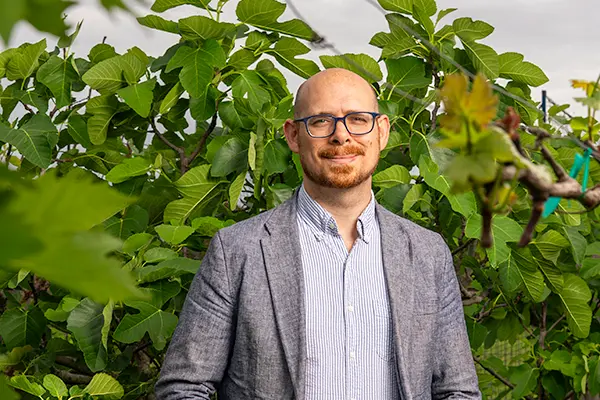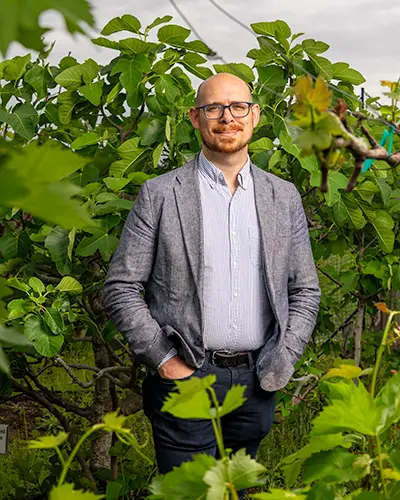Weston Twardowski learned early in life the pleasures of storytelling. He was 8 years old when he wrote a travel article with his mother for a local newspaper. As a student at Fontainebleau High School in Mandeville, Louisiana, he participated in plays and thought about being a director at a regional theater.
“Theater was the discipline that I invested the most time and energy on,” he said. In college, though, he found that he also enjoyed research and went on to receive two degrees, one in theater and another in history at Louisiana State University. Thinking he might become a theater historian, Twardowski furthered his education by earning a master’s degree in theater studies from the University of Houston.
With three degrees under his belt, he went for another — an interdisciplinary doctorate in theater and drama at Northwestern University. The interdisciplinary program allowed him to take courses outside of theater and drama, and he focused on ethnography to deepen his understanding of cultures.
While pursuing his Ph.D., Twardowski ran a small theater company he had started in Los Angeles. During the summers and holidays, he would fly to California and assist with productions. The mission of Third Culture Theatre was to present plays to underserved communities — audiences who rarely saw people like themselves on stage talking about social issues that deeply affected them.
“We wanted to put on plays that reached new and diverse audiences,” he said.
The theater presented such plays as “The Tragic Ecstasy of Girlhood,” which tells the story of a young woman who, because of the circumstances of her life, winds up in a juvenile detention center. The play featured a cast predominantly of women of color.
“I have always been driven by telling stories that I feel can have a transformative impact on audiences,” Twardowski explained. “The theater that has always interested me is the one that deliberately seeks to weigh in and intervene in the way we understand the world. I’m passionate about telling stories that aren’t given stage time.”
In 2021, Twardowski brought that same passion to Rice as he filled two roles — associate director for the Center for Environmental Studies and associate director of EcoStudio in the Sustainability Institute. In both positions, he uses interdisciplinary approaches to educate underserved communities about environmental and social justice.
In 2023, thanks to a grant from Bridge Building Research on Inequality and Diversity to Grow Equity, Twardowski started and developed a summer program for public high school students to explore environmental issues affecting their communities and consider ways in which they can be part of the solution.
The theater that has always interested me is the one that deliberately seeks to weigh in and intervene in the way we understand the world. I’m passionate about telling stories that aren’t given stage time.
— Weston Twardowski
That program was expanded last year through a $500,000 federal grant that was given to EcoStudio and Rice’s Office of STEM Engagement. The new program, Houston Environmental Action Learning, is a two-year initiative, which will include a greater number of students and teachers.
Through the program, the students live on campus for a week and visit Hermann Park, a community garden, Galveston and BakerRipley campuses, where they can conduct research projects.
“We give students a lot of research methodology training and access to tools so they can conduct their own research,” Twardowski said. He added that the program also teaches students how to communicate their research findings to the greater community.
“We want them to understand their own neighborhoods and the various challenges affecting those communities, but we also want them to express some of these ideas in a way that encourages more people to come to the table and do meaningful environmental work.”
One student, he said, created a short film and another student wrote slam poetry about environmental justice. A third student created a badge campaign in which people would sew onto their clothes a badge that contains a QR code that connects to environmental organizations, making it easier for people to get involved in building cleaner and safer communities.
Another project that Twardowski has launched is an oral history of the Indigenous people of Texas. “Native peoples in Texas have been historically marginalized and often denied access to their traditional lifeways,” Twardowski said. “Many of the tribes have been nearly disappeared. Therefore, it is critical to preserve their memories.”
The project is partnering with the Texas Tribal Buffalo Project, a nonprofit organization dedicated to reconnecting Native Texans to their historic food and culture. Twardowski has enlisted the help of four Rice students to interview Indigenous people around the state via Zoom and telephone.
“So, what we’re trying to do is build an archive for researchers and identify the needs of Native communities to better promote access to resources and political mechanisms to build Native sovereignty in Texas,” he said.
Yet a third project that Twardowski has created is Gulf Stream, a weekly, hourlong radio program at 90.1 FM KPFT Houston that focuses on environmental and climate issues. Every Monday at 9:30 a.m., Twardowski goes on the air to cover a range of topics around Houston, the Gulf Coast and the world. Three Rice undergraduate students help with the research and occasionally host the radio show. Together, they have presented more than 70 episodes.
“Working with Dr. Twardowski has been a truly enriching experience,” said Rice senior Jadyn Bray-Boyce. “He has an exceptional ability to transform seemingly mundane ideas into something extraordinary and deeply meaningful. But perhaps above all, his extensive interdisciplinary knowledge allows him to connect ideas across fields, engaging a broad audience and inspiring widespread action.”
She adds, “The work Dr. Twardowski is doing is invaluable not only to Rice University but also to the wider environmental studies community. I feel profoundly honored to have had the opportunity to work with him.”
David D. Medina
Director, Multicultural Community Relations
Public Affairs


